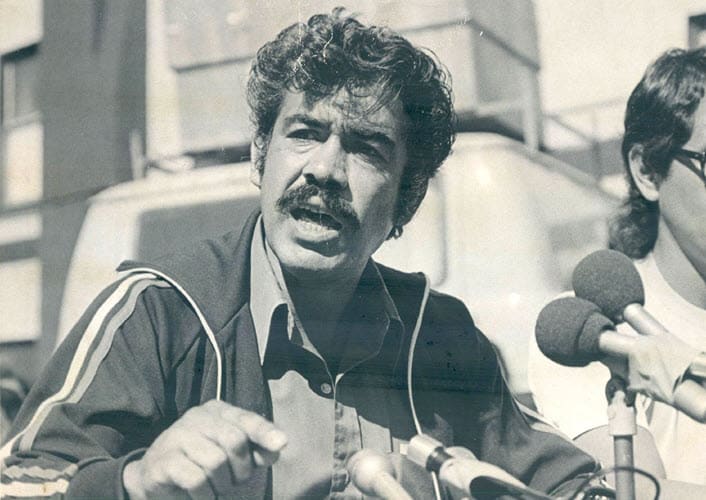Image Courtesy: Google Doodle
Rodolfo Corky Gonzales (18 June 1928 – 12 April 2005) was a Mexican-American boxer, poet, political organizer, and activist. He was one of many leaders of the Crusade for Justice in Denver, Colorado.
Life and Career
Rodolfo “Corky” Gonzales, a prominent Mexican-American figure, led a multifaceted life and career marked by boxing prowess, poetic talent, and civil rights activism. Born on June 18, 1928, in Denver, Colorado, Gonzales initially gained recognition as a featherweight boxer known for his potent left hook. Yet, his experiences with racial discrimination and inequality in the United States, especially against Mexican Americans, propelled him into the realm of civil rights activism. In the 1960s, Gonzales emerged as a prominent leader in the Chicano Movement, a grassroots movement that sought to address the social, political, and economic disparities faced by Mexican-Americans.
Throughout his youth, Corky worked in the sugar beet fields with his father, a first-generation Mexican immigrant who taught him to take pride in his heritage. Despite his limited free time, Corky graduated high school at just 16. He saved for college but after one year couldn’t afford the high cost of tuition, so he embraced his athleticism to become an amateur boxer in 1944. At 19, Corky went pro as a featherweight. At the peak of his career, he was ranked as a top 3 featherweight boxer worldwide, but discriminatory organizers never gave him the chance to fight for the title. Retiring from boxing as a local star in 1955, he decided to use his platform and influence to advocate against racial and socioeconomic injustice across the nation.
In 1966, Corky founded the Crusade for Justice, a grassroots Chicano civil rights organization. He organized demonstrations in Denver and across the U.S., marching alongside civil rights leaders such as Cesar Chavez and Martin Luther King, Jr. In 1969, Corky furthered the cause by organizing the first National Chicano Youth Liberation Conference, where he inspired the younger generation to take pride in their heritage and be part of the cultural revolution.
Corky’s creative writing reflected his activism and honored his Chicano pride throughout his career. His most notable poem “Yo Soy Joaquín” tells the story of a man who travels through history to experience life as multiple Spanish leaders, Indigenous leaders from the Aztec homeland of Aztlán (referenced by the Aztec pyramid on the fourth slide of the Doodle), a Mexican revolutionary, and finally a Chicano in the United States.
Due in large part to leaders like Corky, the Chicano Movement led to widespread positive changes for the Mexican and Latino/a communities in the U.S. that continue to this day. This includes the development of bilingual and multicultural socioeconomic programs, improving the working conditions of migrant workers, and increasing the representation of Mexican-Americans and Latinos/as in U.S. politics and education—all foundational elements to the fight for justice and equality that continues to this day.
He articulated the frustrations and aspirations of his community through his poetry, particularly with his widely acclaimed poem “I Am Joaquin.” Gonzales’s tireless advocacy for civil rights and cultural pride had a lasting impact, inspiring generations of Mexican-Americans to assert their identity and demand equal rights. His life and work serve as a testament to the power of activism and cultural expression in the fight for social justice.
Corky Gonzales passed away on April 12, 2005, leaving behind a legacy of resilience, creativity, and social change.
Award and Legacy
Rodolfo “Corky” Gonzales left a significant legacy in the realms of civil rights activism, literature, and sports, earning recognition and awards for his contributions:
- Legacy in Civil Rights Activism: Corky Gonzales played a pivotal role in the Chicano Movement, which aimed to address the social, political, and economic inequalities faced by Mexican-Americans. His activism led to the founding of the Crusade for Justice, a civil rights organization that advocated for the rights and empowerment of Mexican-Americans. Gonzales’s leadership inspired a generation to take a stand against discrimination, and his efforts contributed to advancements in civil rights and social justice for Mexican Americans.
- Literary Contributions: Beyond his activism, Gonzales was a talented poet and writer. He penned “I Am Joaquin,” a powerful poem that captured the struggles, identity, and aspirations of Mexican-Americans. The poem became a seminal work within the Chicano literary canon and resonated with those seeking to reclaim their cultural heritage and assert their place in American society.
- Awards and Recognition: Corky Gonzales received several awards and honors for his tireless advocacy and contributions to civil rights and culture. In 1984, he was awarded the Denver Mayor’s Millennium Award for his commitment to civil rights. In 2015, he was posthumously inducted into the Colorado Latino Hall of Fame in recognition of his enduring impact on the state’s Latino community.
- Cultural Influence: Corky Gonzales’s legacy extends to the broader Latino and Chicano communities in the United States. His work and activism continue to inspire individuals and organizations dedicated to promoting social justice, cultural pride, and equal rights for all. His writings and speeches are studied in academic settings, and his name remains synonymous with the struggle for civil rights among Mexican-Americans.
In sum, Rodolfo “Corky” Gonzales’s life and work have left an indelible mark on the civil rights movement and Chicano culture in the United States. His contributions continue to resonate with those who seek justice, equity, and the celebration of their cultural heritage.
On 1 October 2021, Google celebrated Rodolfo Corky Gonzales with a doodle.

